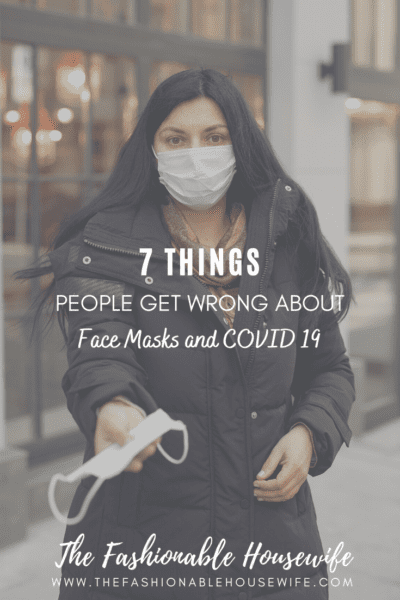
There has been a lot of confusion since the beginning of this pandemic about face masks and coverings. At first, surgical masks were said to be practically useless. Then they became mandatory on public transport and in many enclosed spaces. Most people had little to no idea about face masks and coverings before this, and many still don’t understand a lot about them. Let’s take a look at some of the things a lot of people get wrong about face masks and COVID 19.
Cloth and Surgical Masks Can’t Stop the Virus
This is wrong, though there is a germ of truth in there. One of the most common misconceptions about face masks and COVID 19 is that masks should be worn to protect yourself. This is the wrong part. The main goal of wearing masks is to protect others first and foremost.
That’s because virus particles are simply too small for regular surgical or cloth masks to block them. This is why there was such a fuss about N95 masks because these are the ones that can actually be used to block the virus. They’re called N95 because they’re able to block up to 95% of particles, or those small as 0.3 microns in size. This is about one-third of the size of a smoke particle.
This is also why people have been fighting over these masks and they are so prized by medical personnel. These are needed by medics since they have to be in contact with patients who may not be able to have masks on all the time.
Surgical and cloth masks, on the other hand, work to reduce the number of particles that are released in the air. This is why they require compliance from everybody. Only when the number of surgical or cloth mask wearers reaches a critical mass can it help block a virus.
You Can’t Reuse Face Masks
That’s not entirely true. In reality, it all depends on the mask. You have manufacturers like Sonovia, for instance, that have masks that are fully reusable and retain their filtering properties for over 65 washes. They also released a nice piece on N95 vs. surgical mask filtration. It explains in detail the differences between the two, and how their mask is different. They speak about the technology being the product, and how it compares with the two other options as well.
When it comes to N95 masks, those should indeed be thrown away after use. The same is true about surgical masks. But you can clean most cloth face masks, as long as it’s not specifically stated that you can’t. It is also recommended that you dry them in the sunlight if possible, as it has been shown that the virus dies quickly when exposed to sunlight.
Face Masks’ Only Use is to Block Particles
Again, that is not true. In addition to preventing particles from spreading in the atmosphere, wearing a mask also limits contact to the face, which is very important. People touch their faces every day without even realizing it. And if you think you can mindfully control it, think again.
One study found that people touched their faces an average of 16 times per day. A lot of if not most of this contact is completely subconscious. The mouth area also happens to be the most vulnerable area for infection, followed by the eyes. Wearing a mask can significantly drive down infection cases that way.
You Don’t Need to Wear a Mask if I Don’t Feel Symptoms
Wrong. We now know that the coronavirus can be transmitted even if the person is showing no signs of it. This means you cannot afford to lower your guard and put other people at risk. Not only that, but a good portion of people who are affected will show no symptoms at all. Since you don’t know if you might be active, there is no real way to know if you’re safe or not.
Face Masks will Increase Carbon Dioxide Levels

One of the fears some people have about wearing face masks is carbon dioxide. There is a condition called hypoxia, which is very real and happens when there’s a lack of oxygen in your tissues due to low supply. However, there is no evidence that face masks cause hypoxia in healthy adults. Medical professionals have been wearing masks for years with no issues, so there’s no reason why you should experience any issues either.
You might feel uncomfortable in your mask, however. Surgical masks and most cloth coverings are very breathable, but if you’re using something that restricts airflow, try to keep your talking to a minimum and practice breathing through the nose. This will reduce the amount of humidity in the mask.
There is No Proof that Wearing a Mask Works
This is another myth that is perpetuated by many conspiracy theorists out there. In reality, there is extensive data on the efficiency of wearing face masks to stop epidemics in public settings. The Lancet reviewed over 172 studies spread across 16 countries, and all of them pointed to the benefits of wearing N95 and surgical masks.
Besides that, there is a reason why these masks are used by medical professionals. It’s because they work. Surgical masks were made specifically to prevent infection to patients during surgeries, and N95 masks are used not only in the healthcare industry but in tons of other industries where people are exposed to harmful agents. So, if it’s working for them, there’s no reason they wouldn’t work for you.
I Don’t Need to Wear a Mask if I Keep My Distances
Yes, maintaining your distance can indeed help reduce the chances of you getting infected, but you are still in danger and represent a danger to others.
The opposite is also true. Just because you’re wearing a stylish face mask, it doesn’t mean that social distancing isn’t essential as well. The two should be used together, along with other hygiene measures, to keep infections to a minimum. This might seem like overkill to some, but every step plays a crucial role in further driving cases down.
This is why you should not be complacent and do everything you can to limit infections, even if it’s not mandated. If you’re living with someone who’s at risk, for instance, it would be a good idea to wear a mask when you’re in close contact with them. Try to leave the windows open if possible, so you can create an airflow.
If you’re going out, try to time your outings, so public transport isn’t crowded. If you’re going to have family events or gatherings, try to keep things outside as much as you can. Also, try to limit face to face contact as much as possible, and consider getting a test if you feel any symptoms. Doing all these things will allow you to not only protect yourself but the people close to you.
As you can see, there are still a lot of misconceptions about face masks. These can go from the bizarre to the downright dangerous, so make sure that you learn everything there is to know about them and this virus if you want to keep those around you safe.



